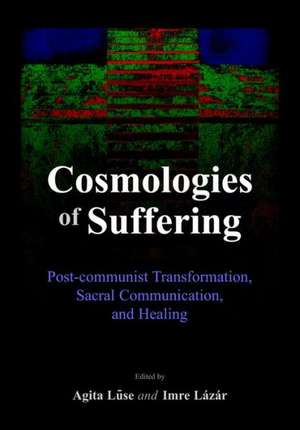Cosmologies of Suffering: Post-Communist Transformation, Sacral Communication, and Healing
Editat de Imre Lazar, Agita Luse, Agita Lseen Limba Engleză Hardback – 31 aug 2007
Preț: 459.49 lei
Nou
Puncte Express: 689
Preț estimativ în valută:
87.92€ • 90.71$ • 73.37£
87.92€ • 90.71$ • 73.37£
Carte indisponibilă temporar
Doresc să fiu notificat când acest titlu va fi disponibil:
Se trimite...
Preluare comenzi: 021 569.72.76
Specificații
ISBN-13: 9781847182586
ISBN-10: 1847182585
Pagini: 235
Dimensiuni: 150 x 220 mm
Greutate: 0 kg
Ediția:New.
Editura: Cambridge Scholars Publishing
ISBN-10: 1847182585
Pagini: 235
Dimensiuni: 150 x 220 mm
Greutate: 0 kg
Ediția:New.
Editura: Cambridge Scholars Publishing
Notă biografică
Agita Luse is lecturer in Social Anthropology program at Riga Stradins University and senior researcher at the Institute of Philosophy and Sociology of the University of Latvia. She has studied philosophy at the latter university, completed MSc course in anthropology at London School of Economics in 1995 and received PhD from Bristol University in 2006. In her doctoral thesis she explored the changing discourses of mental distress in post-Soviet Latvia. Her current research interests focus on social integration of psychiatric service users in that country. She has authored a number of articles in the field of anthropology of religion and medical anthropology, edited a volume on life-stories The narrative and the human life (Cilveks. Dzive. Stastijums, Latvian Association of Anthropologists, 2002), and translated into Latvian several books, including C. Geertz's Interpretation of Cultures (1998). She was recently elected to the Committee of Medical Anthropology Network of the European Association of Social Anthropologists. Imre Lazar graduated from Semmelweis University of Medicine (Budapest) as a medical doctor in 1981. While undergoing training in psychotherapy in the late 1980s he became interested in medical anthropology. He received his MSc in Medical Anthropology from Brunel University and his PhD in Behavioural Sciences from the Hungarian Academy of Sciences, for the thesis Social-psychoimmunology. Psychoimmunological explanatory models in medical anthropology. He has been teaching medical anthropology since the Institute of Behavioural Sciences was founded at Semmelweis University in 1993. After he became the head of the Department of Medical Anthropology there in 2004 he started to organize an international MSc Course in Medical Anthropology in the region. Since 2003 he is associate professor at the Institute of Communication and Social Sciences at Karoli Gaspar University of Reformed Church, Budapest. His research interests include human ecology, anthropology of dance, alternative medicine, medical pluralism and sacral communication. He has authored a number of monographs and edited volumes in Hungarian and co-edited (with H. Johannessen) the volume Multiple Medical Realities (Berghahn 2006).
